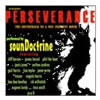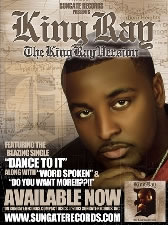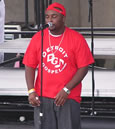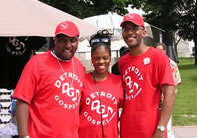|
|
|
|
An
Exclusive Interview with Holy Hip-Hop Recording Artist King Ray
Talking a good game is a dominant trademark in the identity of the hip-hop artist; so many rappers, both secular and holy, want and claim to be the one that “changes the game” or blows your mind with the next urban anthem. As he opens his disc, Ray Tucker, better known as King Ray, sets himself at the starting line of a prestigious road, and he uses some big words. Hearing words such as “seminal”, “inspire”, and “new generation”, the listener takes a look into King Ray’s vision and understands that this guy is all about “doin’ it big.” However, what is the quality that will make him stand out from the crowd of other holy hip-hop artists in this generation? Does King Ray have the prowess to achieve the bold declaration that outlines his mission? Let’s consider the 18-track King Ray Version for what it is. “Fake” and “bland” certainly aren’t words I would use to describe this album. King Ray is one of those artists whose music I wouldn’t mind “blastin’” while I’m on the road. From the very first cut, there is an energy that King Ray transfers to the listener that makes you want to “dance to it”. He kicks out a chain of dance tracks with some mega-lyricism that are perfect for any party or gathering…or a church family picnic. He possesses a caliber that most would only attribute to a secular artist and adds heat to the flame with a barrage of real, anointed rhymes that make his CD a three-dimensional compilation. But King Ray doesn’t just offer hot tracks and skillful lyricism on his CD. His consistent expression of personal issues is a hallmark that brings depth to disc. Songs such as “Word Spoken”, “Repentin’” and “I Just Wanna Luv Ya Girl” give you insight into the soul of King Ray, leaving no stone unturned as you explore his Version, but he has no problem flipping the script and making your head bob. Holiness and humility are the necessary agents among today’s generation of holy hip-hop artists, and King Ray has them. I can say that because I’ve heard his conversation, and this guy is all about giving God the glory. Sure, he opens his album talking the talk, and it may appear conceited at the least, but it also has to be understood that King Ray knows exactly where his help is coming from: only from the God that created heaven and earth. King Ray’s approach to gospel music intrigues me, and I believe he has the musical, lyrical, and spiritual potential to establish himself as a “cool” and innovative urban gospel artist. So I spent some time discussing King Ray’s ministry with him and getting his Version for myself.
Conway: Where exactly did the name “King Ray” come from? King Ray: Well, I could give you something biblical or something like that, about being a king and a priest, but you know how your parents tell you that you have to eat all your food? I would never eat the stuff that I didn’t want to eat even if I got a beating, and my mom use to say “Do you think you’re royalty or something?” And it became like a little joke like, “Does Master King Ray want his cabbage?” Then I just decided it sounded like a nice rap name and I just kept it around. Conway: I was listening to the intro to your CD, and it says, “Every year an artist comes along and makes a seminal album that changes the way we think about music…He or she finds a connection that we don’t make…They make an album that blows everyone away, which in turn, inspires a brand new generation of artists.” Considering that, what is your vision for your ministry? You have a song on the album called “Revolution”. Is this a revolution just against everything ungodly, or are there some issues in the church that you want to address? King Ray: It’s actually a little bit of both. My calling and whatever I do is to bring the attractiveness back to the Gospel of Jesus Christ and to help develop the Christian lifestyle to where it’s not “uncool” so to speak. I’ve never really experienced being an outcast. When I got saved, a lot of people got saved just because I got saved. When we were making the CD, we wanted to make a Christian hip-hop CD that was just as good or better than anything that’s out, secular or not. And also, we wanted to change the way people perceived Christian or gospel music from a hip-hop, urban, and contemporary perspective. And to give hope to people that are making or want to do Christian music, but don’t want to do it the way that other Christian [artists] have, and don’t want to do the same sounding gospel music, but want to venture out and talk about life situations from a Christian perspective and things of that nature. Conway: It’s interesting that you put it that way, because I noticed that you have a Christian love song on the CD, and on the song “That’s Right”, you’re pretty much telling the devil, “Shut up, and sit down, stupid!” It was a powerful point that you made about coolness and what it is to be cool and be a Christian. I think you really trigger that aspect on the CD. On “Cool Ray (Session)”, you say, “I’m cool like ice, I’m cool like aid, I’m cool like the coolest dude when you was in the twelfth grade.” It’s stuff like that that blows my mind that anybody has attempted to bring that aspect to gospel music. How do you respond to people when they say that you’re moving away from the message and becoming too worldly or arrogant? King Ray: I just put it basic. Jesus Christ was sure of Himself and His relationship with God. He was here to be an example for us. In the word, it says we’re the head and not the tail, that we’re above only, and not beneath, and that we’re supposed to be here reigning on earth just like it’s supposed to be in heaven. We’re supposed to have authority. People are supposed to want to be like us. When you break down what Jesus’ ministry was in the four gospel accounts, it was Jesus walking around with His friends. He wasn’t going [out] to do anything special. He was walking around minding His own business, and people would stop what they were doing and follow Him, and that’s the same type of appeal that we’re supposed to have today. People are supposed to stop what they’re doing and check out what we’re doing because we have the information. We have the source of power that they need. We should walk around like that, not arrogantly or condescending like “I’m better than you,” but “I do have a better source of power. I do have the better way in my after-life. I do have the better God. You can have the same thing I have, but if you don’t, you’re missing out.” Not, “I’m missing out on what you’re doing.” Conway: It seems like you also have a lot of personal experience on your album on songs like “Repentin’”, “Word Spoken”, and “Promise”. These songs are personal songs that are expressing things. Maybe the lyrics in some of your songs aren’t “God I praise You” verbatim, but in the songs, you’re expressing Christian principles. In the song “Promise”, you give tribute to the virtuous woman. You made it so personal. What does this CD do for you on a personal level? Does it minister to you as you minister to others? King Ray: Both. As a Christian, I’m here living a life just like everybody else. When we were doing something with this album, we wanted to do something that wasn’t being done, and what I felt was missing were real life experiences. I know how to praise. I know how to worship. I know how to have bad times, but how do I go to work? How do I hang out with my friends? How do I approach a girl I like? What if I fall off and get into some trouble with some girl one day or something like that? How would I handle that situation? Does this happen to any other Christians? We wanted to make sure we made music that people could live to, because most of the time, when you think about a particular time in your life, you flashback to a particular song. [For example, you might] remember when you were eight years old, and there was this one song that used to be your jam in the summertime. We need to do that with gospel music. We need to have songs that remind you of those times or help you through those times, not that I’m knocking praise and worship because I praise and worship, but it’s just that if everybody’s coming out with praise and worship, how are we developing the all around lifestyle of a believer? We need to address some issues because a lot of people know how to praise and worship, but when it comes to expressing how they feel to the opposite sex, they don’t know how to do it because the only way I know how to do it is from this R. Kelly song. I don’t knock any artist for whatever they do, but the truth of the matter is we need to help guide other situations. Plus, I wanted to make some positive gospel music about women. Usually, any time you hear something about a woman at church, it’s something bad. It’s always “these jezebels.” What about “this woman is virtuous”? Any time you hear a rap song about a woman, it’s always something about how she’s trying to make me fall out [God’s] will. The men of God aren’t treating women right in their music and when they’re speaking about them, and then you go to the world, and it’s worse. We have to do something to help people build self-esteem, and that’s what we’re trying to do. We’re trying to make self-esteem music. Conway: So what gospel music needs in general are more real life experiences and more real lyricism. “Repentin’” tore me up because one of the rhymes is, “So many dra’ws in my face I can hardly see.” It’s powerful because I don’t see a whole lot of people describing their issues like that, but that’s the way you’re dealing with it. Is that what you’re saying gospel music needs? King Ray: Most definitely. Think about it. You go to church. How many people stop going to church because they got pregnant or because they fell off? All the people that are telling people about pre-marital sex are married. [You’re saying] “You’re telling me I should be saving myself for marriage, but you can go and get some.” It’s not unscriptural. I have caught a lot of flack for [“Repentin’”] in particular. But I’m not here to make church people happy about the song. I’m here to relate to my contemporary people. The church is just sweeping those types of issues under the rug. I’m not here to make sure that the church can keep stuff under the rug. I’m here to kick it about real life so I can make some music that people can feel. In Genesis with Joseph and Potiphar’s wife, the same situation that I explain in my song is the same situation Joseph was in. She was in the bed naked; she pulls him in the bed; he runs out; she keeps his clothes; he runs out naked; she’s talking about he raped her. In Proverbs chapter seven, it’s talking about the strange woman. If you listen to the song, I’m following that, but I’m explaining life situations that happened to me.
Contact Info: For more on King Ray (including sample tracks and to purchase CD) visit these websites: sonicbids.com/kingray, and sungaterecords.com. CD also available at God's World in Detroit. SPECIAL NOTE: King Ray's song, "Dance To It" is one of 15 finalists for inclusion in HOLY HIP HOP: TAKING THE GOSPEL TO THE STREETS, VOLUME 2 Distributed by EMI-GospelTo vote for King Ray, go to http://www.holyhiphop.com/Press/Summission2.htm
and type "Dance To It" in the 1st of the "Top Picks"
fields. ### |
|
|
Search Engine & Site MapHaven't found what you're looking for here? There is a wealth of information on Detroit Gospel.com. CLICK HERE to view our Site Map or type a search request below and click on the "Google Search" button to search this site for a specific person or topic. Click Here To Go Back To The Top of Page Trademark and Copyright Notices |
||
 The Thesis
The Thesis  An Invitation to Worship
An Invitation to Worship Live From Houston: The Rose of Gospel
Live From Houston: The Rose of Gospel  Home Once Again...Live in Detroit
Home Once Again...Live in Detroit Nights of Soul
Nights of Soul somethin' 'bout love
somethin' 'bout love  Live At Abbey Road
Live At Abbey Road


 All Day...The William Murphy Project
All Day...The William Murphy Project
 My Heart Depends On You
My Heart Depends On You Robert E. Norwood
Robert E. Norwood  The Covenant Project
The Covenant Project Perseverance
Perseverance Expectations: I'll Praise
Expectations: I'll Praise Feels Good
Feels Good  The Best of Thomas Whitfield
The Best of Thomas Whitfield This Time
This Time Here I Go Again
Here I Go Again Purified
Purified Gospel Today Presents: Praise & Worship Volume 2
Gospel Today Presents: Praise & Worship Volume 2
 King Ray at PraiseFest 2004
King Ray at PraiseFest 2004 King Ray, Renee' & Keith
King Ray, Renee' & Keith

